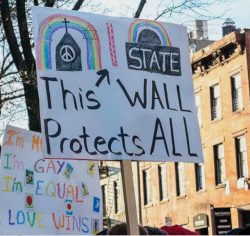Thomas Jefferson once declared that the Establishment Clause of the First Amendment to the United States Constitution was intended to build a wall of separation between the church and state. Have the recent Supreme Court rulings eroded this purpose? And what do these ruling mean for the role of religion and lawmaking in the larger society across the United States? [ dur: 58mins. ]
- Samuel D. Brunson is Associate Dean for Faculty Research and Development at Georgia Reithal Professor of Law at Loyola University Chicago School of Law. He is the author of God and the IRS: Accommodating Religious Practice in United States Tax Law and God Is My Roommate? Tax Exemptions for Parsonages Yesterday, Today, and (if Constitutional) Tomorrow.
- Andrew Koppelman is John Paul Stevens Professor of Law and Professor of Political Science at Northwestern University. He is the author of The Increasingly Dangerous Variants of the “Most-Favored-Nation” Theory of Religious Liberty and The Supreme Court and the new religious aristocracy in the Hill.
- Micah Schwartzman is the director of the Karsh Center for Law and Democracy and the Hardy Cross Dillard Professor of Law at University of Virginia. He is the co-author of Establishment Clause Appeasement, When Do Religious Accommodations Burden Others? and The Quiet Demise of the Separation of the Church and State.
- Caroline Mala Corbin is Professor of Law at the University of Miami School of Law. She is the author of Opportunistic Originalism and the Establishment Clause, The Supreme Court’s Facilitation of White Christian Nationalism and Justice Scalia, the Establishment Clause and Christian Privilege.
This program is produced by Ankine Aghassian, Doug Becker, Mihika Chechi, Melissa Chiprin, and Sudd Dongre.
Podcast: Play in new window | Download (Duration: 58:01 — 53.1MB) | Embed
Subscribe: Apple Podcasts | Spotify | RSS
